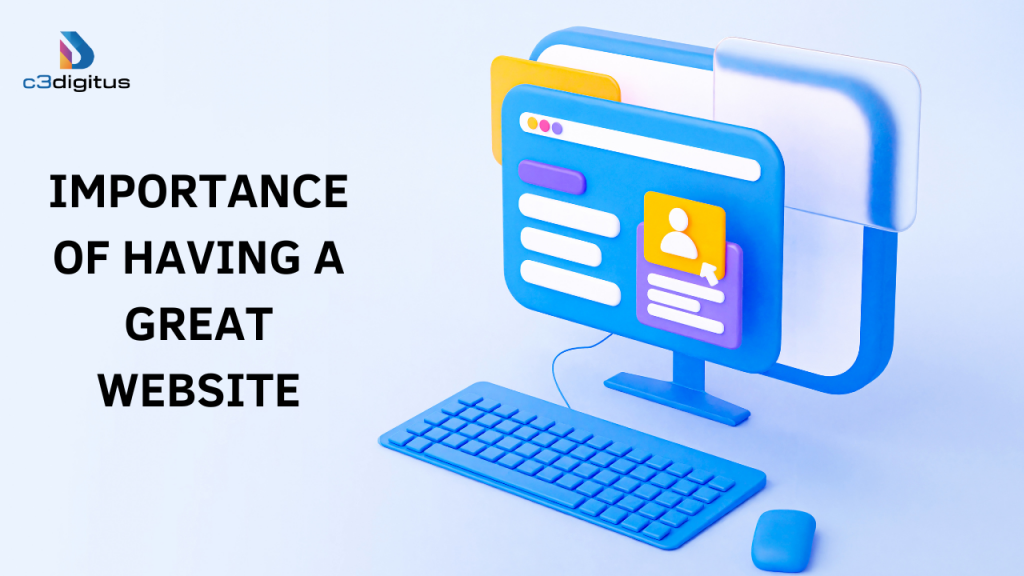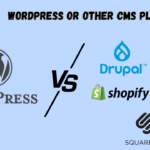In this fast-paced internet world, websites are more than words, graphics, and email addresses. After all, a website serves as the hub of your business and a powerful asset in today’s highly connected world. It is imperative to have a quality website whether you’re running a small local business or a multinational corporation.
This blog will explore the importance of a website, its role in business growth, and how it supports marketing, engagement, and branding efforts.

Making a Strong First Impression
Websites are often the first point of contact for customers and it is crucial to create a positive first impression that will last.
- Build Trust: A well-organized, easy-to-navigate website presents a visually appealing picture of your professionalism. Visitors arriving at a poorly designed site may be suspicious about what your business can deliver.
- Generate Interest: People quickly decide whether to explore or leave your website. Consistent branding, high-quality images and videos, and attractive designs help hook visitors and generate interest.
- Set the Tone: An important part of a website is the introduction. This will make a strong impression and clearly show visitors what services your brand offers.
A website is not just something that exists online; it should reflect your company’s identity. So, make sure to use it to its full potential.
Establishing Credibility and Trust
Trust is everything when it comes to the internet. One of the most effective strategies for establishing trust with your target audience is through a website.
- Showing Social Proof: Displaying customer testimonials, case studies, and reviews directly on your site reassures visitors that others trust your business.
- Highlighting Expertise: Use your website to showcase certifications, awards, and other credentials. A dedicated “About Us” page can tell your brand’s story and demonstrate your expertise.
- Providing Clear Information: Customers appreciate transparency. Build trust by clearly explaining your products or services, prices (if applicable), and payment methods.
Changing customer perceptions might take years, but a properly structured website is a huge step in the right direction.
Reflecting on Your Brand Identity
Your website is the digital embodiment of your brand, acting as a platform to communicate your values, mission, and unique selling points (USPs).
- Consistent Visual Branding: Use colors, fonts, and logos consistently across your site to reinforce your identity.
- Clear Messaging: Every element, from headlines to images, should reflect your brand’s voice and tone.
- Portfolio Showcase: For businesses in creative or technical fields, a website is the perfect place to highlight projects, case studies, and achievements.
If you’re in the process of shaping your brand’s digital foundation, understanding what WordPress is and how it empowers flexible, brand-aligned website design can help you make more confident decisions.
Your website tells your brand’s story—make sure it reflects the values you want to convey.
Improving User Experience (UX)
UX design is very important for keeping or attracting visitors on the web page and having them scroll down for more information.
- Fast and Responsive Design: No one likes a slow website. The speed and ease of navigation between pages on a website are essential.
- Easy-to-Use Navigation: Simple layouts and organized menus assist users in efficiently locating the information they are searching for.
- Accessible on All Devices: Make sure your site can function on all devices whether it’s a computer or a tablet.
- Interactive Features: Elements such as live chat, contact form, and search bars optimize the user experience and help them gain access to whatever they want.
When focusing on user experience, you can raise the level of customer satisfaction, thus, increasing conversions.
Enhancing Online Presence
In today’s internet-driven world, visibility is key to running a successful business. In this case, your website acts as an advertisement for your company.
- Search Engine Optimization (SEO): Good SEO (Properly optimized metadata, headings, internal linking, etc) for web pages increases the chances of internet users finding your business through relevant searches, which can help you attract more customers.
- Content Strategy: Essential and relevant content generated in the form of blogs, videos, and infographics can significantly boost the performance of your website in search engines and maintain audience interest. When deciding how to structure your site for growth, it’s also useful to understand how WordPress compares to other CMS platforms, especially if you’re aiming for flexibility, scalability, and better search visibility.
- Local SEO: When marketing products to specific areas, ensure your website is optimized to make it easier for users to find.
It’s clear that many opportunities, especially in organic search and local search, would likely be missed without a website.

Driving Business Growth
A website serves a primary role in business development through lead generation, conversion, and scope expansion.
- Lead Generation: Features like forms, downloads, and subscription offers capture valuable customer data.
- Effective CTAs (Call-to-Actions): Encouraging users to take action, like signing up for a newsletter or making a purchase, helps grow the business.
- Global Exposure: A website gives you access to a wider audience globally, broadening your market with no physical limitations.
- Upselling And Cross-selling: Highlighting complementary products or services directly on your site increases customer spend.
When properly designed, the website can also be the best salesman for your business.
Supporting Marketing and ROI Efforts
Your website is the main focus of your digital marketing efforts. It works closely with your other online campaigns, such as social media marketing, email marketing, and ads, to create a unified strategy that promotes your business effectively.
- Primary Goal: Drive traffic to your website from social media ads or Google ads, email marketing, and PPC campaigns for more information or purchases.
- Content Marketing and Creation: Posting valuable content like blogs, guides, resources and other relevant content to your audience helps enhance SEO. Before launching your campaigns, consider how your web presence aligns with your chosen platform, whether you’re using WordPress, Shopify, or even comparing tools like Square and Squarespace, since each ecosystem can influence your site’s marketing performance and reporting accuracy.
- Tracking and Analytics: Tools like Google Analytics let you measure the performance of marketing campaigns, helping you make data-driven decisions.
When online marketing is aligned with a great website, the results speak for themselves.
Providing Data Insights and Analysis
A major advantage of having a website is the ability to collect and analyze valuable data.
- Customer Behavior Tracking: Learn how visitors interact with your website—what pages they visit, how long they stay, and where they drop off.
- Performance Metrics: Use analytics to track conversion rates, bounce rates, and overall traffic.
- Testing and Optimization: Features like A/B testing allow you to refine website elements, ensuring you’re offering the best possible experience.
This data empowers you to make informed decisions that improve customer engagement and drive business growth.
Staying Competitive in the Market
In today’s digital age, having an online presence is essential, and not having a website is like running a business without a business card.
- Stand Out: Your website allows you to show your work and distinguish yourself from your competition.
- Promote Unique Selling Points: Your website is the place to highlight key features that make your business more appealing.
- Stay Updated with Trends: Regularly monitoring and updating content and design helps stay up to date with trends to maintain an attractive, modern image.
In the past, many people tried to blend in and not stand out from the crowd. However, times have changed, and now everyone wants to be unique and make a lasting impression. Standing out is the goal.
Always Available to Serve You
A website is never truly ‘off’; it’s always available to attract customers at any time, which makes it special.
- Convenience for Customers: Users can view products, ask questions, or place orders at any time, without being limited by time zones or business hours.
- Global Access: With the internet connecting people worldwide, your website makes it easy for anyone, anywhere, to engage with your business. It allows you to reach and interact with customers around the globe at any time.
Since your website is always available, it becomes a dependable part of your business. It acts like an extension of your company, ready to serve customers and provide information at any time, even when your physical store or office is closed. This makes it a trusted resource for your audience.
The importance of a website cannot be overstated—it’s the backbone of your business in today’s digital era. From creating a strong first impression to driving growth, enhancing marketing efforts, and reflecting your brand identity, a great website is essential for success.
By investing in website development, you’re not just creating an online presence—you’re building a platform for long-term growth, customer engagement, and innovation. Whether you’re starting from scratch or upgrading an existing site, a well-designed, user-friendly website is your ticket to success in an increasingly competitive digital world. Don’t wait—embrace the purpose of a website and create a website that unlocks your business’s full potential today.




